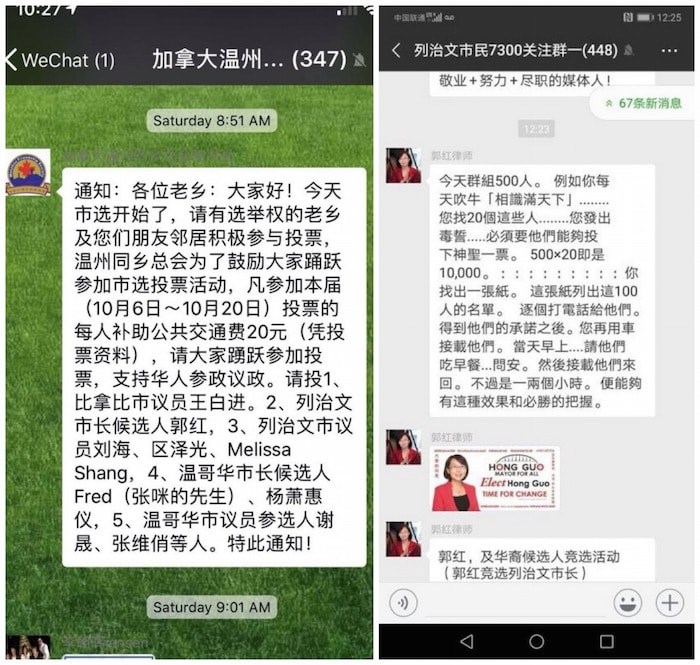The City of Richmond is investigating accusations that two posts on Chinese social media Wechat about this year's municipal elections are crossing the line into vote buying.
According to a screenshot, the Canada Wenzhou Friendship Society asked its members to vote for certain candidates in the coming elections and offered a $20 “transportation subsidy” within a private 347-member Wechat group, last Saturday.

“To encourage people to take part in the municipal elections, the Canada Wenzhou Friendship Society will give a transportation subsidy of $20 for those who vote this year,” said the post.
“Please actively participate in voting and supporting Chinese Canadians to take part in politics.”
The post went on to ask people to vote for Richmond mayoral candidate Hong Guo, incumbent councillor Chak Au, council candidate Peter Liu and Melissa Zhang, and five other candidates in Â鶹´«Ă˝Ół»and Burnaby.
The Richmond News contacted the Society on Thursday and a volunteer who refused to give her name confirmed that the money was offered by the organization on Saturday.
“It (the offer) doesn’t exist anymore,” she said.
“It was the original plan, but then we heard that this is illegal, so we corrected the post soon after. We have sent out multiple clarifications in the group from Saturday to today telling people the offer was cancelled. You can check it out.”
Meanwhile, questions were also asked about a Wechat post from mayoral candidate Hong Guo, who asked people to treat voters to breakfast on Election Day.
The screenshot showed that last week, mayoral candidate Hong Guo asked people in a Wechat group with 448 people to pick up voters and treat them to breakfast on Election Day, “after getting their promises.”
When asked if those practices are considered vote buying, the City of Richmond said it is “aware of these posts and is currently investigating the matter.”
“We will not be making any further comment at this time while our investigation is underway,” said Ted Townsend, spokesperson for the city.
According to the Local Government Act, “a person must not pay, give, lend or procure inducement…to induce a person to vote or refrain from voting,” which would be considered vote buying.
It also noted that a person must not accept inducement to vote or inducement to refrain from voting.
Those who contravene vote buying laws are liable to a fine of up to $10,000, imprisonment for up to two years, or disqualification from holding office for up to seven years.


